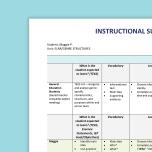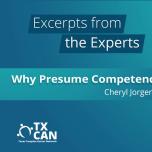Guide to Implementation of Presuming and Constructing Competence

This guide highlights the many opportunities available for constructing students’ competence through various aspects of their educational programs. It also recognizes that part of an educator’s role on the student’s team is as a mentor and coach to other team members who may not have the same level of knowledge and skill.
Topics include how you speak to students, how you speak about students, evaluation results and present levels of academic achievement and functional performance (PLAAFP) section of the individualized education program (IEP), IEP goals and objectives/benchmarks, communication and assistive technology supports, development of supplementary aids and services, placement decisions, and analyzing student behavior.
This document aligns with the Rubric of Effective Practices for Students with Significant Cognitive Disabilities Indicator I: Alignment to State Standards, Indicator II: Effective Teams, Indicator III: Classroom Climate, Indicator IV: Differentiated Instruction, and Indicator V: Social Communication.







